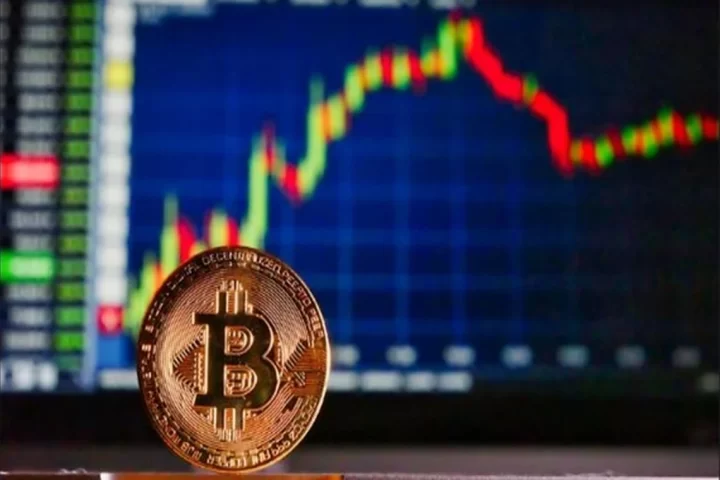The Hong Kong Securities and Futures Commission (SFC) has recently received its inaugural application for a spot Bitcoin (BTC) exchange-traded fund (ETF), marking a significant development in the cryptocurrency investment landscape.
Harvest Hong Kong, one of the largest fund management firms in China, officially submitted its spot Bitcoin ETF application to the Hong Kong SFC on January 26, as reported by Tencent News.
It appears that the regulatory body is actively striving to expedite the approval process for ETFs within the nation, with the aim of launching the first Hong Kong spot Bitcoin ETF shortly after the Chinese New Year, scheduled for February 10.
In a notable parallel to the United States’ Securities and Exchange Commission (SEC), the Hong Kong regulatory authority is contemplating the approval of multiple spot ETFs to ensure a fair and competitive environment.
Although Harvest Fund is the pioneer in filing for a spot BTC ETF, it is anticipated that other financial institutions in the region will follow suit.
Several regional financial entities have already expressed their interest in introducing a spot BTC ETF in the year 2024.
As previously reported by Cointelegraph on January 19, a minimum of ten financial institutions in Hong Kong are actively engaged in the process of launching a spot BTC ETF.
READ MORE: US Regulators Issue Cautionary Crypto Warning: Beware of Overhyped AI Trading Bots
Distinguished players in the financial sector, such as Venture Smart Financial Holdings, have already set their sights on the first quarter of 2024 as their target launch date for the spot ETF.
Furthermore, several crypto-oriented firms that have previously launched futures-based crypto ETFs in Hong Kong are also expected to join the queue for spot Bitcoin ETF applications.
Notably, Samsung Asset Management, which introduced the Samsung Bitcoin Futures ETF in 2023, has expressed its willingness to explore the possibility of launching a spot ETF, demonstrating the growing appetite for cryptocurrency investment products in the region.
Hong Kong has gained prominence as a leading cryptocurrency hub in Asia, owing to its regulator’s crypto-friendly stance in 2023.
The SFC introduced crypto-specific regulations in 2023, granting both institutional and retail investors the opportunity to engage in cryptocurrency-related activities.
Even before the SEC in the United States greenlit the first spot BTC ETF, the Hong Kong SFC had paved the way for cryptocurrency-based ETFs and expressed its readiness to accept applications for the authorization of various funds, including digital asset spot ETFs and existing crypto futures ETFs.
This move has solidified Hong Kong’s position as a key player in the global crypto investment arena.
On January 29th, Google is poised to enact a pivotal policy update that will permit certain cryptocurrency products to be promoted across major search engines.
Among these products, Bitcoin exchange-traded funds (ETFs) are emerging as potential contenders that meet the stipulated criteria, igniting considerable excitement within the cryptocurrency industry.
This significant development traces its origins back to December 2023 when Cointelegraph first reported on Google’s impending revision of its cryptocurrency and related ads policy.
Effective January 29, this revision will enable advertisements from “advertisers offering Cryptocurrency Coin Trust targeting the United States.”
Coinciding with this policy shift is the recent approval of 11 spot Bitcoin ETFs by the United States Securities and Exchange Commission (SEC) on January 10.
Investors who choose to acquire shares in these spot Bitcoin ETFs effectively secure a stake in the ETF’s Bitcoin holdings.
Importantly, this aligns perfectly with Google’s updated requirements, which specify a focus on “financial products that allow investors to trade shares in trusts holding large pools of digital currency.”
Crypto analysts are buzzing with optimism regarding the potential influx of investments into Bitcoin ETFs, buoyed by Google’s formidable transaction processing capacity in managing search requests.
Recent data from DemandSage underscores the sheer magnitude of Google’s daily search volume, which stands at an astonishing 8.55 billion searches.
Nevertheless, it’s worth noting that Google’s policy update employs the somewhat nebulous term “cryptocurrency coin trusts” when referring to the permitted products, leaving some room for interpretation.
READ MORE: Crypto Analyst Urges SEC to Rethink Licensing Requirements for Local Exchanges
Meanwhile, a noteworthy development in the cryptocurrency landscape involves the Grayscale Bitcoin Trust (GBTC), one of the largest Bitcoin trusts.
Recently, it transitioned into a spot Bitcoin ETF, following approval from the SEC on January 10.
Previously, GBTC shares were exclusively available to accredited investors and were subject to a mandatory six-month holding period.
Accredited investors, under U.S. regulatory standards, are individuals with a net worth exceeding $1 million or an annual income surpassing $200,000 for the past two years.
These requirements are designed to shield less knowledgeable investors from potentially risky ventures that could lead to financial losses.
In contrast, spot Bitcoin ETFs are accessible to the general public in the United States and are regulated under the Securities Act of 1933.
This regulatory framework adds an extra layer of security, potentially making them a safer avenue for Google to explore in its advertising efforts.
The anticipation surrounding Google’s policy update has been building since August 2021, when prominent cryptocurrency trader Michael van de Poppe expressed optimism about the potential influence of Google ads on Bitcoin-related products.
This optimism has been further fueled by the SEC’s exploration and subsequent approval of Bitcoin Futures ETFs in October 2021, signaling a growing acceptance of cryptocurrency-related investment products in the mainstream financial landscape.
Tesla’s decision to divest its Bitcoin holdings has led to a missed opportunity of over $300 million in potential profits.
The electric vehicle company initially entered the world of cryptocurrency in February 2021 with a groundbreaking investment of $1.5 billion when Bitcoin’s price was approximately $36,000.
Since Tesla’s first reported Bitcoin balance on February 8, 2021, the company’s stock price has decreased by about 40% compared to Bitcoin’s performance.
Specifically, Tesla’s stock (TSLA) has underperformed Bitcoin (BTC) by 40.1%, while Bitcoin itself has appreciated by 7.39% against the US dollar, and Tesla’s stock has declined by 35.7% against the US dollar.
Tesla’s approach took an unexpected turn when the company sold roughly 10% of its Bitcoin holdings in March 2021 and around 75% in the second quarter of 2022.
Elon Musk, Tesla’s CEO, explained that these sales aimed to showcase Bitcoin’s liquidity and strengthen Tesla’s financial position during uncertain times.
Had Tesla retained its entire Bitcoin investment, it could have realized a hypothetical profit exceeding $300 million, given Bitcoin’s current value of around $41,500.
READ MORE: US Government Plans to Sell $118 Million Worth of Seized Silk Road Bitcoin
However, Tesla has maintained its remaining Bitcoin holdings, estimated at approximately 9,720 BTC, in recent quarters, signaling a more conservative strategy in anticipation of a bullish year for Bitcoin.
Interestingly, Tesla’s previous Bitcoin sales coincided with quarters where the company reported weaker free cash flows, which represent the cash generated after covering operational expenses.
For instance, in the first quarter of 2021, Tesla’s $272 million Bitcoin sale accounted for a staggering 93% of the company’s free cash flows during that period.
Similarly, in Q2 2022, the 73% reduction in free cash flows aligned with Tesla’s Bitcoin sales. It appears that Musk relied on Bitcoin to boost finances during Tesla’s financially constrained periods.
However, the situation may change, as Tesla’s free cash flows have been on the rise throughout 2023. In Q4 2023, Tesla’s free cash flow was a robust $2.1 billion, contributing to a total of $4.4 billion for the year.
Many analysts predict a potential increase in Bitcoin’s value in 2024, citing the approval of spot Bitcoin exchange-traded funds in the United States and the expected impact of the upcoming Bitcoin halving event as key factors driving their optimism.
Tesla’s decision regarding its remaining Bitcoin holdings may be influenced by its improving financial outlook and the evolving cryptocurrency landscape.
The approval of spot Bitcoin exchange-traded funds (ETFs) by the United States Securities and Exchange Commission (SEC) on January 10 has raised concerns about potential misconceptions regarding cryptocurrency regulations.
Rostin Behnam, the chair of the Commodity Futures Trading Commission (CFTC), highlighted these worries in a keynote speech on January 26.
Behnam emphasized the risk of investors, both retail and institutional, misinterpreting the recent SEC decision as comprehensive regulatory oversight for Bitcoin and other cryptocurrencies.
Although spot Bitcoin ETFs can now provide exposure to the cryptocurrency, they are supervised by SEC-regulated stock exchanges.
However, Behnam pointed out that there is still a lack of regulatory oversight for the broader cash market of digital assets, which includes cryptocurrency exchanges.
He stated, “There remains nothing firmly in place to address the opaque and inconsistent practices in the cash markets for digital assets.”
This absence of regulatory clarity in the cash market has implications for the transparency of Bitcoin ETFs, as asset management firms acquire the underlying assets from this market.
Behnam expressed concerns about trade settlement, conflicts of interest, data reporting, cybersecurity, customer protections, transparency, and overall market integrity.
READ MORE: Zaki, Financial Scammer and PayFuture Owner, Wants Your Money
Behnam also criticized the concept of Bitcoin ETFs, describing them as speculative and volatile assets wrapped in a thin layer of indirect regulation and presented as new investment products.
The issue of cryptocurrency regulation has been a prominent topic within the U.S. government, driven by the demands of the crypto industry.
In September 2023, CFTC Commissioner Caroline Pham proposed a limited pilot program to address crypto regulation, warning that the U.S. might need to catch up with crypto-friendly jurisdictions if regulatory clarity is not established.
She suggested that this program could resemble regulatory sandboxes previously implemented at the state level.
Many anticipate that there may be increased regulatory clarity following the U.S. presidential election in November.
A survey conducted on January 2 by the Crypto Council for Innovation revealed that a candidate’s stance on digital assets was considered important by most individuals in the crypto industry when deciding their vote, indicating the growing significance of cryptocurrency regulation in the political landscape.
Investor Chris Burniske has made a bold prediction regarding the future of Bitcoin, foreseeing months of struggle ahead for the cryptocurrency as it attempts to recover its lost ground and challenge previous highs.
In a recent post on X (formerly Twitter), Burniske, who currently serves as a partner at the crypto venture capital firm Placeholder, suggested that the price of BTC could potentially drop to a minimum of $30,000.
Burniske’s outlook aligns with a growing number of crypto industry figures who are also anticipating further declines in Bitcoin’s price.
However, Burniske’s floor target is notably lower than some of his peers, indicating a more bearish stance.
He emphasized that Bitcoin may experience a period of decline, possibly testing levels in the mid-to-high $20,000s before any significant recovery toward previous all-time highs.
He cautioned investors about the potential volatility in the path ahead, including possible fakeouts, and suggested that this extended downturn could take months to play out.
Burniske’s forecast extends beyond the upcoming block subsidy halving in April, indicating that the recovery may be a longer-term endeavor.
While Bitcoin is expected to face challenges, Burniske also anticipates a more challenging situation for altcoins, warning investors to exercise patience during this period of uncertainty.
READ MORE: Federal Court of Canada Rules Emergency Crypto Law Used Against Truckers Unconstitutional
He stressed that other cryptocurrencies may experience greater percentage declines compared to Bitcoin.
Despite his bearish outlook, Burniske made it clear that he was not inclined to change his long BTC position, expressing confidence in Bitcoin’s long-term potential.
This perspective on Bitcoin’s future aligns with the broader sentiment in the crypto industry, where several factors are influencing predictions of continued weakness in BTC’s price.
These factors include macroeconomic influences tied to U.S. financial policies and global liquidity trends, which have a significant impact on crypto markets.
Other industry figures, such as Arthur Hayes and notorious trader Il Capo of Crypto, have also made bearish predictions about Bitcoin’s price, with some suggesting the possibility of a dip to $30,000 or even $12,000.
However, some analysts, like Il Capo of Crypto, see a temporary reprieve for Bitcoin bulls and anticipate a potential rebound if key levels are reclaimed.
As of the time of writing, BTC/USD was trading near $40,000, but the future remains uncertain, with investors closely monitoring developments in the crypto market.
JPMorgan analysts have suggested that investors have likely completed most of their profit-taking from the Grayscale Bitcoin Trust (GBTC), potentially alleviating downward pressure on Bitcoin’s price.
This observation coincides with record high daily net outflows from United States spot Bitcoin exchange-traded funds (ETFs) on their ninth day of trading.
In a market report dated January 25, the analysts, led by Market Strategy Managing Director Nikolaos Panigirtzoglou, stated that “GBTC profit taking has largely happened already.”
This implies that much of the negative influence on Bitcoin stemming from this source has subsided.
Grayscale’s fund had been trading at a discount to its net asset value since early 2021.
The analysts attributed the $4.3 billion outflows from the fund since its conversion to an ETF on January 11 to “profit-taking on previous GBTC investments.”
This profit-taking is seen as one of the key reasons behind Bitcoin’s recent price drop of nearly 20%, causing it to trade below $40,000 following the launch of multiple U.S. Bitcoin ETFs.
JPMorgan’s assessment follows a significant event where the ten approved spot Bitcoin ETFs experienced a net outflow of $158 million on January 24.
READ MORE: Polygon Labs Unveils AggLayer: Transforming the Blockchain Landscape into a Unified Network
This marked the largest net outflow since their launch, as per BitMEX research data shared on social media platform X on January 25.
Grayscale’s ETF witnessed $429 million in outflows on January 24, while the most recent data from BitMEX for January 25 indicated a decrease to $394 million – the second-lowest outflow on record.
Data for January 24, compiled by X account CC15Capital, revealed that Bitcoin ETF holdings held by all ten funds declined by 4,610 BTC, valued at nearly $184 million.
In their note, JPMorgan analysts also highlighted the emergence of BlackRock and Fidelity’s spot Bitcoin ETFs as competitors to GBTC.
These ETFs have accumulated assets under management of $1.9 billion and $1.8 billion, respectively.
On January 24, BlackRock’s spot Bitcoin ETF experienced the lowest inflow since its launch, attracting only $66.2 million.
Despite this, it increased its Bitcoin holdings by 1,663 BTC, bringing its total to nearly 45,700 BTC.
In conclusion, JPMorgan analysts believe that the bulk of profit-taking from GBTC is likely over, potentially relieving the downward pressure on Bitcoin’s price.
However, they acknowledge the emergence of strong competitors in the form of BlackRock and Fidelity’s Bitcoin ETFs.
According to analysts at Cantor Fitzgerald, eleven of the largest publicly traded Bitcoin miners may face profitability challenges if the price of Bitcoin (BTC) does not experience a significant increase following the upcoming halving event.
CleanSpark’s executive chairman and co-founder, Matthew Shultz, shared this research on January 25th, highlighting concerns for miners like Marathon Digital, Riot Platforms, and Core Scientific, as their mining operations may no longer cover their costs.
While Bitcoin miner revenues are closely tied to BTC’s price, Luxor’s executive emphasized that miners often employ strategies to mitigate potential losses from price volatility.
Nevertheless, Cantor Fitzgerald’s assessment suggests that, at the current BTC price, UK-based Argo Blockchain and Florida-based Hut 8 could be the most vulnerable post-halving, with an “all in” cost-per-coin rate of $62,276 and $60,360, respectively.
Hut 8 reported in its January 5th update that it held 9,195 BTC, worth $377 million at current prices.
Cantor analysts only expected Singapore-based Bitdeer and US mining firm CleanSpark to maintain profitability following the halving, assuming an average BTC price of $40,000 and no drastic changes in hash rate.
The “all in per coin” metric takes into account all costs incurred in producing a single Bitcoin, including electricity and hosting fees.
READ MORE: Surge in Ethereum Execution Client Diversity Raises Decentralization Hopes
The Bitcoin halving, scheduled for April, involves cutting mining rewards in half, potentially impacting miners with high operational costs.
If BTC’s price does not cover these costs, their situation could worsen.
However, many market experts believe that the halving could drive a long-term increase in BTC’s price, which would alleviate this concern.
Dan Rosen, associate director of derivatives at Bitcoin miner Luxor, explained that miners often employ various strategies to hedge against BTC price fluctuations, such as purchasing derivatives products like hash rate futures contracts and BTC-related options.
Cointelegraph attempted to contact several Bitcoin miners mentioned in the report for comment, but no immediate responses were received.
The fate of these miners will depend on BTC’s post-halving price performance and their ability to manage operational costs in an evolving market.
The United States government’s decision to sell approximately $118 million worth of seized Silk Road Bitcoin has sparked discussions within the cryptocurrency market.
The announcement of this planned sale came through a forfeiture notice on January 10, which gained attention on social media on January 24.
This move follows the sentencing of Silk Road Xanax dealer Ryan Farace and his father Joseph Farace for money laundering conspiracy on January 8.
While some members of the crypto community expressed concerns that this auction might result in a significant Bitcoin “dump,” many market experts disagree.
Steven Lubka, the managing director at the Bitcoin exchange Swan Bitcoin, downplayed the impact of the sale, describing it as “peanuts” compared to the recent outflows from the Grayscale Bitcoin Trust (GBTC).
The GBTC has sold a substantial 106,575 BTC worth $4.2 billion since converting to a spot Bitcoin exchange-traded fund on January 11, with an additional 10,871 BTC outflow on January 24.
Furthermore, the planned sale by the U.S. government represents only 1.5% of its total holdings of approximately 194,188 BTC, equivalent to $7.7 billion, acquired from three separate seizures in criminal cases.
READ MORE: The 4 Early Projects to Watch Before Going Mainstream in 2024
This figure still accounts for less than 1% of Bitcoin’s overall circulating supply.
The three sources of Bitcoin held by the U.S. government include 94,643 BTC seized in January 2022 from the 2016 Bitfinex hack, 69,369 BTC seized in November 2020 from the Silk Road, and 51,326 BTC seized from Silk Road hacker James Zhong.
Approximately 41,000 BTC is expected to be gradually offloaded through four sales scheduled throughout 2023.
Notably, the U.S. government has a history of auctioning off seized Bitcoin assets.
In 2014, venture capitalist Tim Draper purchased nearly 30,000 BTC through such an auction.
More recently, the government has opted to sell seized cryptocurrencies on exchanges instead of holding auctions, with the last known sale involving 9,118 BTC in March 2023.
Overall, the upcoming sale of seized Silk Road Bitcoin by the U.S. government is expected to have a limited impact on the cryptocurrency market, given its relatively small scale compared to recent market activities and the government’s total holdings.
In his latest blog post titled “Yellen or Talkin’?” dated January 24, Arthur Hayes, the former CEO of BitMEX, has delivered a bearish short-term price prediction for Bitcoin (BTC), suggesting it may encounter a significant drop to $35,000 or even lower.
Despite Bitcoin’s remarkable 75% increase over the past year, Hayes identifies a confluence of factors that could contribute to this impending downturn.
One of the primary concerns outlined by Hayes is the ongoing Red Sea conflict between the United States and the Houthis, which is having ramifications on global shipping.
He notes that this conflict could lead to increased inflation as risk assets, including cryptocurrencies, anticipate a potential shift by the Federal Reserve in March, involving reduced interest rates to attract liquidity back into the market.
Hayes highlights that elevated shipping costs, driven by weather and geopolitical issues, may cause a surge in inflation during the third and fourth quarters of the year.
To combat this, he speculates that Fed Chair Jerome Powell will engage in verbal intervention, signaling potential rate cuts without actually implementing them.
Hayes emphasizes that Bitcoin is uniquely positioned to benefit from this scenario, as it thrives in times of economic uncertainty.
Another factor Hayes touches upon is the state of the U.S. regional banking sector.
READ MORE: Hugewin Review 2024: Is It Legit and Safe? A Breakthrough in Crypto Casino Gaming
He mentions that since the financial crisis in March 2023, the U.S. government has provided support through the Bank Term Funding Program (BTFP), which is set to expire soon.
Despite lingering financial problems within the banking sector, Hayes believes that the fate of liquidity and other related issues rests on Treasury Secretary Janet Yellen’s future decisions.
Hayes suggests that a few banks may need to fail if the BTFP is not renewed to pave the way for the cuts, QT taper, and potential resumption of Quantitative Easing (QE) that the market expects in March.
He asserts that the only thing that could surpass fighting inflation in priority is a financial crisis.
Regarding Bitcoin’s price, Hayes predicts that it could experience a substantial correction, potentially reaching $33,600, or a 30% decline from its peak after ETF approval at $48,000.
He believes that Bitcoin might find support within the range of $30,000 to $35,000.
As a result, Hayes has taken a position by purchasing put options with a strike price of $35,000 expiring on March 29, 2024.
This sub-$35,000 level, according to Hayes, presents an opportunity for investors to capitalize on the impending market dip.
On January 23, BTC/USD briefly touched $38,500 on Bitstamp, its lowest point since early December, before rebounding approximately $1,700 higher, as indicated by data from Cointelegraph Markets Pro and TradingView.
Grayscale’s Bitcoin Trust (GBTC) has displayed a ray of optimism as its outflows have recently slowed for the second consecutive day, hinting that the massive Bitcoin selloff might be nearing its conclusion.
Data from BitMEX Research indicates that on January 24th, GBTC outflows amounted to $429 million, marking the smallest daily outflow since the inception of Grayscale’s spot Bitcoin ETF on January 11th.
This also signifies a 33% reduction compared to the outflows observed at the beginning of the week on January 22nd.
Eric Balchunas, an ETF analyst at Bloomberg, observed on January 25th that GBTC outflows appear to be on a downward trend, though he acknowledged that the figure is still considerable.
He pointed out that there remain several uncertainties regarding when the “mass exodus” from GBTC will come to an end.
Over the course of nine trading days, GBTC has seen a significant outflow of 106,092 BTC, equivalent to around $4.4 billion.
However, it is crucial to note that a slowdown in daily outflows does not necessarily indicate that GBTC’s “bleeding” has ceased or significantly slowed down.
Balchunas had previously estimated that GBTC would need to lose approximately 25% of its outstanding shares before the outflows come to a halt.
READ MORE: Avalanche Foundation Sets Criteria for Memecoins Seeking Share of $100 Million Fund
Adding to the complexity, Arkham Intelligence, a blockchain tracking firm, has cautioned against misinterpreting the GBTC transaction data displayed on its platform.
In a January 24th post, Arkham clarified that the outflow data for GBTC exhibited on its platform is divided between Coinbase Prime and new GBTC custody addresses.
Consequently, not all of the BTC being transferred from Grayscale’s Bitcoin Trust is necessarily being redeemed. This is due to the inherent structure of Bitcoin transactions, which often split outputs among multiple addresses.
Arkham further explained that “GBTC custody wallets frequently send to multiple addresses,” meaning that a portion of the BTC sent in a transaction might be directed to an address different from the main recipient indicated in the transaction panel.
In summary, while the recent slowdown in GBTC outflows provides a glimmer of hope for investors, it’s essential to approach the data with caution and consider the complexities of Bitcoin transactions, as highlighted by Arkham Intelligence.
The future trajectory of GBTC and its outflows remains uncertain, and investors will likely continue to monitor the situation closely.










